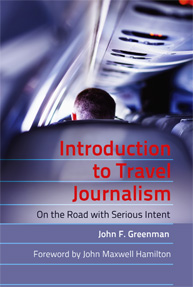Chapter 1
Expert advice, what not to do
Posted: February 16, 2013 Contents: Chapter 1, Resources | Tags: chapter 4, travel journalism, travel writing, what not to do Leave a comment »The Resources section of the text offers the travel writer advice from 100 freelance journalists. Carlo Alcos offers some good advice for the travel journalist in the article What Not to Do. Here’s one of his pieces of advice,
DO listen to yourself and be authentic to what your gut tells you.
Society these days is “noisy.” We’re being bombarded with information through news, websites, advertisements, social media; pulled and yanked in this direction and that direction. It’s enough to give you whiplash. It can be extremely hard to shut out the static and turn inward, into yourself to listen to what it is that you actually want. Go for a run; meditate; do some yoga; take a walk in the forest. Ask yourself questions and sense how your body reacts — your physiological responses like increased heart rate, a “funny feeling in your stomach”,…
Interviews
Posted: February 5, 2013 Contents: Chapter 1 | Tags: interview, savvy traveler, travel advice, travel interview, travel journalism, travel writer, travel writers exchange, travel writing, trisha miller Leave a comment »Chapter 1 coaches the travel journalist on the basics of journalistic practices including methods. Trisha Miller of the TravelWritersExchange offers her own advice.
Truly savvy travel writers know that there is another tool at their disposal, one that gives them more article angles, and the opportunity to both attract new readers and potentially add a more multi-media-rich experience to their personal brand toolbox.
I’m referring of course to interviews. The kind you conduct with various people you encounter on your travels.
Start by focusing on those whom you think your readers would find interesting, and branch out from there. It’s better to have more material than you can use, than to not have enough.
Participate! The best way to get the story
Posted: October 20, 2012 Contents: Chapter 1 | Tags: jennifer neves, participate, travel advice, travel journalism, travel writers exchange, travel writing Leave a comment »Jennifer Neves of Travel Writers Exchange.com offers advice to travelers on how to get the biggest bang for his or her traveling buck. The author, a professional travel writer, offers this tidbit as her most important way to get the biggest bang for your buck:
“Participate! If you are always observing, you may be able to write about an event in great detail. The colors, the smells, the action, but you will never be able to write about how it feels. Reflecting on what you have experienced is more powerful than a hundred pages of descriptions about the things you have not experienced – and more interesting to read. Your readers want to relate to you. They want to relate to the people in the places you describe.”
Akin to the advice offered in Chapter 1 Neves…
Beef up stories with interviews
Posted: October 20, 2012 Contents: Chapter 1 | Tags: interview, travel interview, travel journalism, travel writers exchange, travel writing, travelwritersexchange.com, trisha miller Leave a comment »Chapter 1 encourages the travel writer to talk to at least one local to add dimension and a unique perspective to his story. One way to do this is by conducting interviews. Trisha Miller of Travel-writers-exchange.com provides tips for conducting a great interview. Among her advice Miller lists:
- Always prepare in advance.
- Interview people in their own environment – So if it’s a chef, ask if he can be interviewed in the kitchen.
- Make an audio recording & take notes – have a back up recording
- The better the subject appears is the better the writer will appear.
Miller ensures the writer that following her advice will offer the writer interesting and entertaining content that readers yearn for.
Become a better observer
Posted: October 20, 2012 Contents: Chapter 1 | Tags: active observation, become a better observer, david miller, matador network, matadornetwork.com, observation, observer, travel journalism, travel writing Leave a comment »While Chapter 1 urges the travel writer to employ more tools than just observation while investigating her story, observation is still an effective primary source of information. David Miller, at the Matador network has offered these exercises to becoming a better observer. First he discusses active observation which he states,
Active observation is trying to see the connections between what’s visible in someone (their expressions, clothes, what they’re doing) and invisible (their histories, upbringing, dreams, desires). This is key, because within the gap between what’s visible and invisible is often where the deepest, most credible, and most interesting stories are found.
To practice observations, Miller states, try these three exercises:
- Stories out of photos
- analyzing how relationships are…
Pico Iyer – Why travelers travel
Posted: October 3, 2012 Contents: Chapter 1 | Tags: pico iyer, travel advice, travel journalism, travel writing, why we travel, world hum, worldhum.com Leave a comment »Travel writer and journalist Pico Iyer offers this tidbit to WorldHum.com on why individuals travel:
Travel… guides us toward a better balance of wisdom and compassion—of seeing the world clearly, and yet feeling it truly. For seeing without feeling can obviously be uncaring; while feeling without seeing can be blind. Yet for me the first great joy of traveling is simply the luxury of leaving all my beliefs and certainties at home, and seeing everything I thought I knew in a different light, and from a crooked angle.
